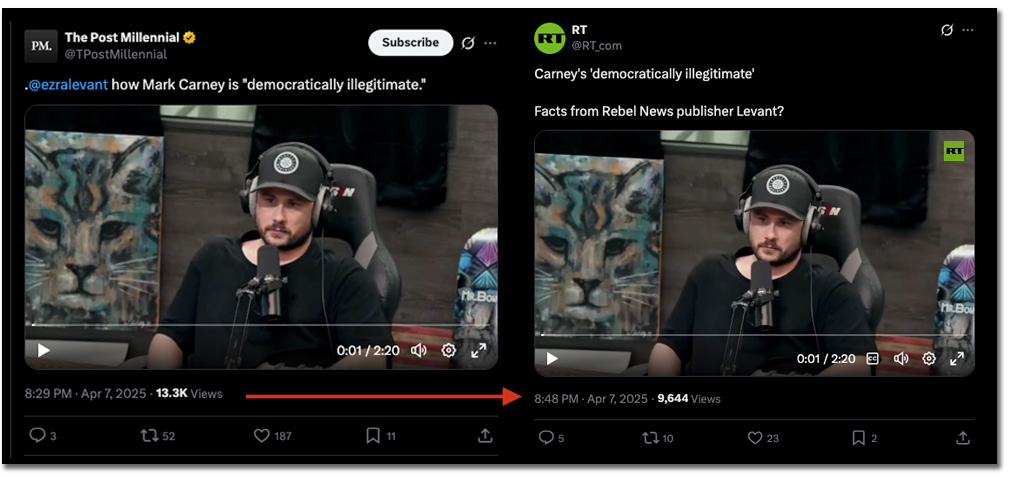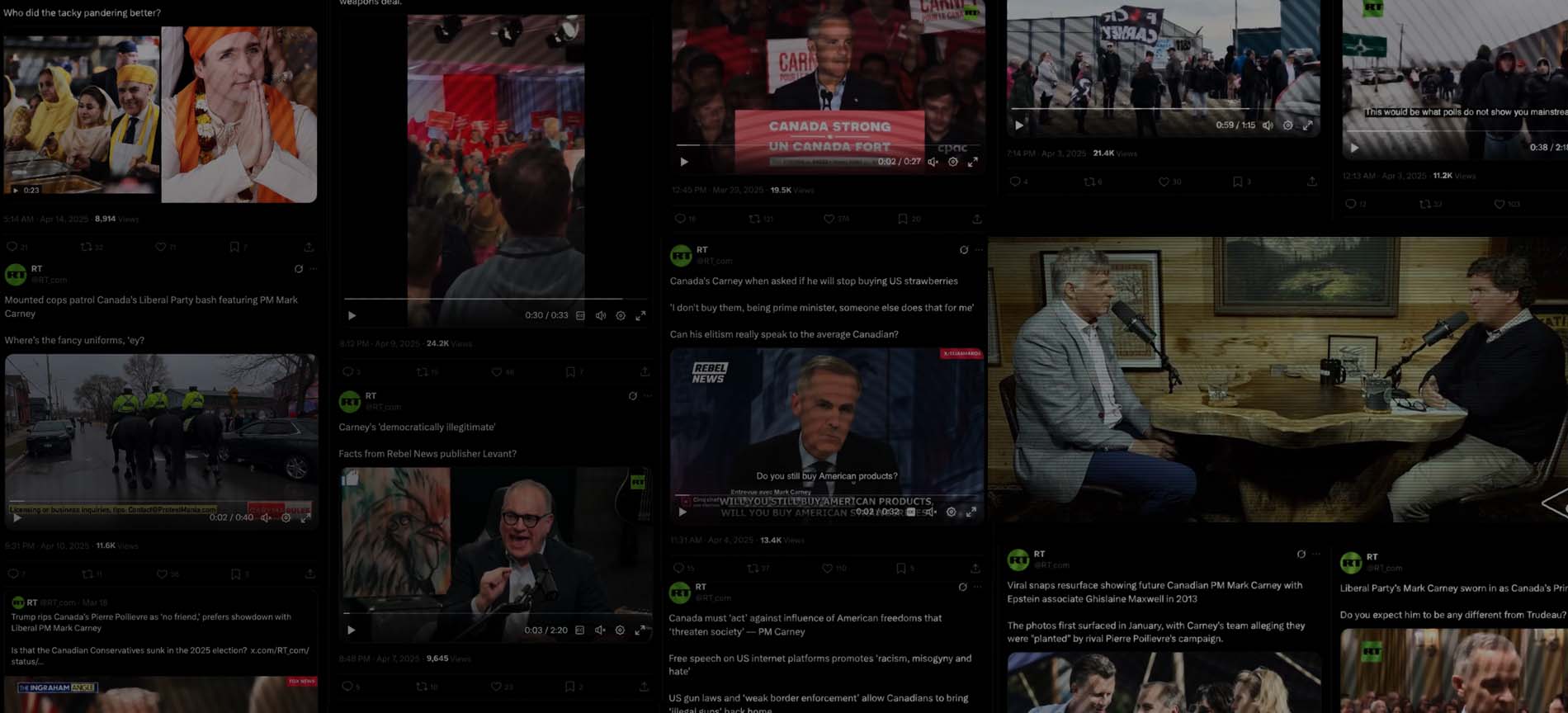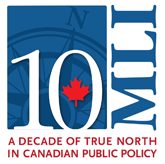RT Recycles Far-Right Canadian Election Videos and Targets Mark Carney
Since Mark Carney’s election as leader of the Liberal Party, Russian state media, particularly RT, has devoted disproportionately high attention to him. Immediately after Carney assumed leadership, Sputnik News, a Kremlin-controlled outlet, published an aggressively negative article deploying well-established Russian disinformation narratives aimed at discrediting him.
Between March 9 and the present, RT has posted at least 56 tweets mentioning Carney, compared to just 12 mentioning Conservative leader Pierre Poilievre. Of these 56 posts, 26 were explicitly election-related, negatively targeting Carney and the Liberal Party. Four posts criticized Carney’s support for Ukraine, while 23 posts exploited growing divisions between Canada and the United States.
It is important to note that The US State Department and Canada’s Global Affairs have identified RT as a component of Russia’s global intelligence operations. Global Affairs has also warned in the past that “RT is also actively participating in Russian efforts to influence elections abroad.”
At least six of RT’s tweets included videos or screenshots recycled directly from Canadian far-right media outlets—often within minutes of their original posting—suggesting RT actively monitors and amplifies Canadian far-right platforms to intensify political polarization.
For instance, RT repurposed a video originally posted by “Dacey Media” about a Conservative rally in Kingston, Ontario, on April 2. RT’s tweet questioned the reliability of election polling, captioned with: “can polls be faked?”

Screenshot of the original post on the left, and the recycled and repurposed video in the RT post on the right.
In another example, RT retweeted a video from Rebel Media featuring Carney answering a casual question about buying strawberries. RT reframed the content with a partisan caption, asking: “Can his elitism really speak to the average Canadian?”

Screenshot of the original Rebel News video on the left, and the recycled video repurposed by RT on the right.
A further example involved RT retweeting a video from the Post Millennial Twitter/X account less than an hour after its initial publication. RT amplified the claim that Carney is “‘democratically illegitimate.'”

Screenshot on the left posted by the Post Millennial account, and a post by RT repurposing the video on the right.
Importantly, there is no current evidence indicating any direct relationship between RT and the Canadian accounts from which these videos originated. However, RT’s deliberate targeting of Canada’s election and its amplification of polarizing, partisan content aligns closely with the objectives of Russian information operations described in a September 2024 FBI affidavit on Russia’s Doppelganger operation. That operation instructed Russian operatives to exploit societal divisions in Western democracies to erode trust and societal cohesion.
In 2021, DisinfoWatch was the first organization to expose a Chinese government influence operation targeting the Conservative Party and its leader, Erin O’Toole. Similarly, according to the SITE Task Force, China has continued to target Conservatives during the 2025 federal election.
US Far-Right Influencers and Conspiracy Theorists Inject Themselves into the Canadian Election
During an interview with Maxime Bernier, leader of Canada’s far-right People’s Party, U.S. political commentator Tucker Carlson made multiple false and inflammatory claims about Canada. He accused Conservative Party leader Pierre Poilievre of being a “fraud” and devoted much of the conversation to disparaging Poilievre, Prime Minister Justin Trudeau, Mark Carney, and Canada as a whole.
In one particularly egregious segment, Carlson made a racist and factually incorrect statement, claiming that many towns where French Canadians had once built churches are now “African.” This comment echoes white nationalist talking points and seeks to stoke racial division in Canada.
Clips from the interview, including the segment containing this remark, are included below:
In our previous election update, we noted that U.S. conspiracy theorist Alex Jones publicly endorsed Maxime Bernier, leader of Canada’s far-right People’s Party.
Jones—infamous for promoting dangerous conspiracies about 9/11, school shootings, COVID-19, and QAnon—continues to exert influence across both American and Canadian far-right and anti-democratic online communities. His endorsement of Bernier highlights growing cross-border radicalization risks, where extremist rhetoric originating in the U.S. seeps into Canada’s political discourse. This fusion encourages polarization, hate speech, and deepening mistrust in democratic institutions.
Bernier’s willingness to accept and amplify the endorsement of a figure like Jones should be deeply concerning to Canadians. Embracing such support risks normalizing politically violent narratives and importing toxic elements of U.S. political extremism into Canadian public life. This alignment threatens social cohesion and may heighten the risk of political violence during an already volatile election period.

Carney Campaign and Chinese Government-Linked Information Operations
In early April 2025, the Government of Canada’s Election SITE Task Force confirmed that a coordinated online influence campaign linked to the Chinese government had targeted the Liberal Party leader Mark Carney during the 45th federal election. The operation, identified by SITE, represents a new stage in the evolution of Beijing’s efforts to interfere in Canadian democratic processes—one that blends subtle manipulation with coordinated amplification across foreign-language platforms largely unmonitored by Western oversight.
According to the report, the campaign was conducted almost entirely on WeChat, a Chinese-language social media platform heavily used within Canada’s Chinese diaspora communities. The content at the center of the operation was traced to a WeChat account named Youli-Youmian (有理儿有面), which SITE attributed to China’s Central Political and Legal Affairs Commission—a powerful Communist Party body overseeing domestic security and law enforcement. The account regularly posts content aligned with Chinese state propaganda and has been used in previous international information operations.

Screenshots includded in the SITE report: “WeChat articles from the Youli-Youmian account that targeted LPC Leader Mark Carney. Social media engagement for these articles was high, even exceeding the engagement level on state-controlled media outlets like the People’s Daily, which averages about 30,000 interactions per post / Image caption 2: Bot-like WeChat news accounts that appear dedicated to amplifying content from the Youli-Youmian account. These accounts do not post original content, and often re-post Youli-Youmian content in a sequence, and only minutes apart. Some of the bot-like accounts continue to re-post Youli-Youmian content days after it was originally posted, likely to improve discoverability of the article, and boosting Youli-Youmian’s presence in user feeds.”
Rather than simply attacking or promoting a single candidate, the campaign alternated between praise and criticism of Mark Carney. Initially, it portrayed Carney positively—particularly his critiques of the United States, which may have resonated with Beijing’s strategic interests. This was followed by waves of negative content that questioned his leadership qualifications, foreign policy views, and intentions toward China. SITE’s analysis suggests that this contrast was intentional, designed to confuse or polarize opinions among diaspora voters.
The campaign was not contained to a single source. SITE tracked at least 30 other WeChat accounts that functioned as amplifiers—reposting Youli-Youmian’s content in a coordinated fashion. Altogether, the content generated by this operation saw high engagement—between 85,000 to 130,000 interactions and estimated viewership reaching as high as 3 million users. By contrast, typical engagement for even official Chinese state media outlets like People’s Daily is considerably lower, underlining the effort’s intensity and reach.
This campaign reflects several broader trends we’ve observed in Chinese regime-aligned foreign interference. First, it underscores the continued reliance on linguistic and cultural silos to shield disinformation from public and media scrutiny. Second, it demonstrates how these operations are increasingly multi-dimensional—no longer just seeking to discredit opponents, but to sow division, provoke confusion, and subtly shift public opinion within targeted communities.
Chinese Government Targets Conservative Candidate Joe Tay
In the lead-up to Canada’s 45th general election, Conservative candidate Joe Tay, who is running in Don Valley North, has been identified as the target of a transnational repression operation orchestrated by the Chinese government. The Security and Intelligence Threats to Elections (SITE) Task Force reported that Tay is being subjected to a coordinated disinformation campaign across various social media platforms, including WeChat, Facebook, TikTok, and ReNote.
Tay, a Hong Kong-born Canadian and former entertainer, is known for his pro-democracy stance and criticism of Beijing’s policies in Hong Kong. In December 2024, Hong Kong authorities issued an arrest warrant for Tay under the National Security Law, accusing him of “inciting secession” and “colluding with foreign forces,” and offered a bounty of HK$1 million for his capture. Tom Blackwell of Canada’s National Post was the first to report on the targeting of Tay and the Conservative nomination campaign as a possible case of Chinese government election interference.
Canadian officials have condemned these actions as attempts to silence dissent and interfere with Canada’s democratic processes.
The SITE Task Force’s findings highlight the Chinese government’s efforts to influence Canadian elections by targeting candidates who oppose its interests. The disinformation campaign against Tay aims to discredit him among Chinese-speaking voters and suppress support for his candidacy. This operation is part of a broader pattern of foreign interference in Canada’s democratic institutions, with previous instances involving attempts to sway election outcomes and intimidate politicians.
In response to these threats, Canadian authorities have increased vigilance and implemented measures to protect the integrity of the electoral process. The government’s commitment to safeguarding democracy includes monitoring foreign interference and ensuring that all candidates can participate in elections free from external coercion.
As the election approaches, the case of Joe Tay underscores the importance of addressing foreign interference and upholding the principles of democratic participation and freedom of expression in Canada.

Caption from SITE: “Facebook post from Today Review that amplified “wanted posters” issued by the Hong Kong police for the six individuals living in Canada and the UK, including Victor Ho and Joe Tay. The post appeared in Written Cantonese on December 24th, 2024, the same day the arrest warrants were issued. The words in the image read: “Hong Kong’s National Security Department strikes again! Six individuals are wanted overseas, including Chung Kim-wah, and Joe Tay. Protecting national security never rests!”

Image caption 2 from SITE: “A Facebook post that looked to denigrate Joe Tay’s candidacy for the Don Valley North riding. Posts like this one above appeared en masse on March 24 and 25th and appear to be timed for the CPC’s announcement that Tay would run in Don Valley North. The post image reads: “Wanted for national security reasons, Joe Tay, looks to run for a seat in the Canadian parliament; a successful bid would be a disaster. Is Canada about to become a fugitive’s paradise?””


